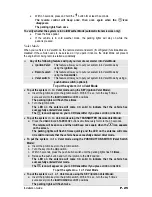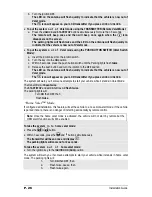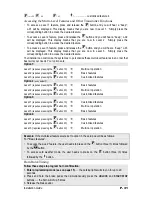
Installation Guide
P. 33
OEM alarm control.
Make sure the module is able to arm and disarm the oem alarm (if
applicable).
Door locks and trunk testing.
Make sure each of these options respond to the
transmitter (if installed).
Starter kill option.
Sit inside the vehicle with all doors closed. Arm the vehicle, then try
to start the engine with the key. The engine should not start. If the engine starts, rewire
the starter kill to reach proper operation.
Valet mode.
Make sure the remote car starter is able to properly enter and exit valet
mode. When setting the remote car starter into valet mode, pressing the lock button will
lock the doors without activating the starter kill. (Refer to the user guide for further
information on valet mode.)
Idle mode.
Make sure the vehicle properly enters and exits idle mode.
Troubleshooting Poor Transmitting Range
Many factors may affect the operating range of the transmitter. Some of these are:
•
The condition of the battery in the transmitter.
•
The operating environment (for example: downtown radio-frequency noise, airports, cellular
phone towers…).
•
Metal: any type of metal will affect operating range. This includes the vehicle itself.
•
The shape of the vehicle can affect range as well (vans in general have less range).
•
The shape of the roof and A-pillars brings about considerable radio-frequency deflection (in
this case, the signal from the remote control). As a result, the direction in which the vehicle is
facing in relation to the remote control can affect the range. Straight on (standing in front of
the vehicle) generally gives you the greatest range; the second best performance is from the
back. Using the remote control from either side of the vehicle will usually give the lowest
range.
•
The range will be significantly lower in a crowded parking lot than in open space.
•
Always hold the transmitter high, approximately at shoulder height.
•
The operating range will be somewhat lower on vehicles equipped with an aftermarket or
factory alarm.





































